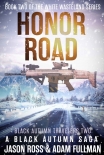Honor Road by Jason Ross (best non fiction books of all time TXT) 📕

- Author: Jason Ross
Book online «Honor Road by Jason Ross (best non fiction books of all time TXT) 📕». Author Jason Ross
But the clan’s best idea so far was to grow crops. They’d have to divert water from the Virgin River, a hundred yards above the homestead, and channel it to the rusty stock watering tank at the high end of their pasture. While they worked on the big pipes, the women and children dug out the foundations of the farmhouse for the cold frame greenhouses. Isaiah swore the ground heat would keep the plants warm enough to survive overnight.
Like everything else in their red rock prison, the crop project was subject to survival math: calories in and calories out. They’d run their food pantry down to a single bucket-and-a-half of raw wheat, six cans of beans, and a half bottle of peaches. A mouse had chewed through the sidewall of the wheat bucket, eaten its fill and pooped in the bucket. Cameron’s boys sorted through the wheat kernels one-at-a-time and picked out the mouse poop. Cameron found where the mouse hid in the floor, ripped up the planking, and caught an adult and three baby mice. They ate them all for breakfast.
Two hundred calories were burned lifting the floor. Fifty calories were gained eating the mice. That was mostly how it worked. They burned twice what they reaped. Every calorie in the natural world, it seemed, had evolved an infuriating system for protecting itself from consumption.
Cameron killed two more snakes while they moved pipe—another rattler and a gopher snake. A mouthful of snake possessed a slight greasiness that landed in the stomach more solidly than starches. Cameron couldn’t fathom why meat would be better than wheat. In any case, they steadily starved notwithstanding; no matter what they picked off the ground, dug out of a rotted log or smashed with a rock.
Cameron and Isaiah were forced to search for irrigation pipe farther downriver, where the willows and cottonwoods shaded the black soil and riverside grasses. For once, they found calories free-for-the-taking: bugs. Lots of bugs. They sent for Isaiah’s ten year-old daughter, Leah. She came with a sleeping bag stuff sack to collect the bounty.
Under every fourth or fifth pipe they lifted from the wet ground, they found seething, green masses of stink bugs—sometimes two or three pounds under a single pipe. Like everything else on the ground, they were both somewhat nutritious and somewhat disgusting. Stink bugs tasted like green apples sprayed by a skunk. They choked them down anyway.
Under the canopy of the cottonwoods, they overturned white grubs, cockroaches, earthworms and assorted insect larvae, all of which went into the fry pan. No matter how much nastiness he swallowed, Cameron felt no difference in his predatory hunger. Even when they had bugs and worms, the level of wheat in the bucket continued to drop, because without the grain every day, he and Isaiah would not be able to work. There simply wouldn’t be enough calories in their bodies.
Under the trees, with young Leah present, Cameron found himself doing his share of the work, despite his strategy to work less and eat more. If he stopped to let Isaiah wrestle pipe on his own, the girl stopped and stared at him watching her father. Her brown eyes framed no malice, but they tracked him with an unblinking judgment that gave Cameron the heebie-jeebies.
“What do you and my first-mom do down by the river? Are you looking for bugs?” Leah asked as Cameron caught his breath in the shade of a cottonwood.
It was an unusual question, made more unusual by the fact that nobody in the group, except Isaiah, spoke unless it was a necessity. Thinking burned calories. Talking burned more. Cameron reminded himself that taking a long time to answer didn’t make him look guilty. Everyone took a long time to answer now.
“We’re looking for frogs,” he lied.
Her eyes betrayed neither suspicion nor doubt. “Did you get some?”
For a moment, he wasn’t sure what she meant. He was definitely getting some, but that couldn’t have been what she meant. She was a naive polygamist kid.
“No. We can hear them, but we haven’t found where they’re hiding.”
She seemed to accept the explanation. “Are you the prophet here?” she asked.
“I’m not a prophet,” he replied without really considering what the word “prophet” meant to her. He chuckled. “I don’t think God throws in with guys like me.”
She cocked her head and watched as her father dragged a section of pipe, then dropped it in exhaustion. “We’re proud to labor for the prophet,” she said with a question hanging in her voice.
Cameron walked to the pipe, bent over and lifted his end. Isaiah followed suit and they duck-walked it toward the old canal bed.
They’d decided to place all the pipe first, then dam the river later. There was no sense building a dam if the salvaged pipe wouldn’t reach the stock tank, but it looked like there would be enough. They were half-way, and dozens of lengths of pipe still littered the property.
Neither of them had ever built an irrigation system before, and a solemn terror stalked Cameron—some unknown gremlin would skulk in the rudimentary mechanics of their plan. It always did, for Cameron. He hadn’t ever done a project that spanned a football field like this one, but drawing upon his one, disastrous attempt to repair his own broken sprinkler system back home, he knew how insidiously uncooperative water could be.
Six years after discovering that his lawn in Anaheim was dying, he still watered it by hand. He tried at least half-a-dozen times to find the problem with the sprinklers only to give up after hours of digging. He refused to call a landscaper, mostly because he couldn’t stand the idea of his wife seeing





Comments (0)